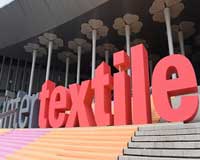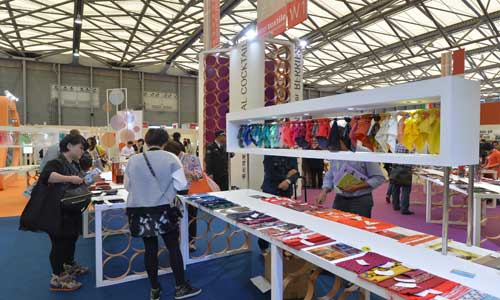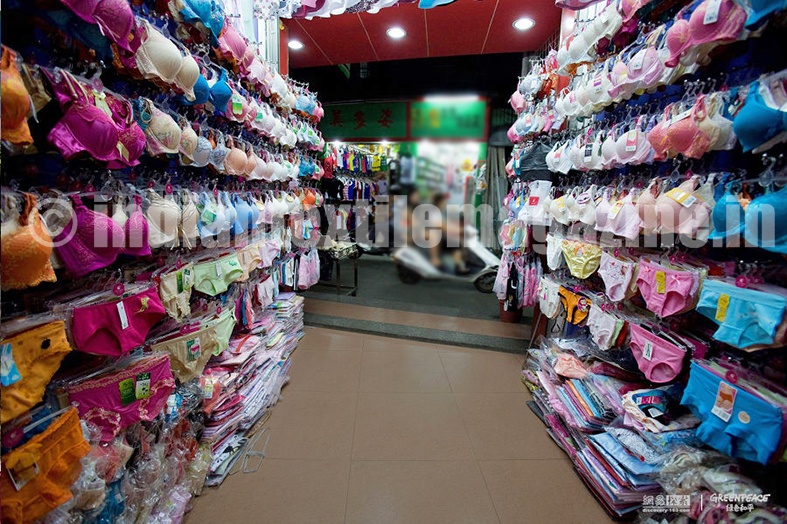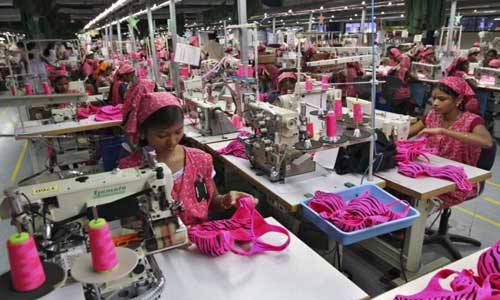FW
French Connection’s losses narrowed in the first half of the year. The struggling fashion brand is continuing to close underperforming stores and in the last 12 months has closed seven stores, resulting in a 10.2 per cent reduction in average retail trading space. New stores will be opened in appropriate locations.
In March, the firm reported its fifth successive annual loss due to mounting competition from fast fashion brands such as ASOS and Zara. However, French Connection is taking significant steps to return to profitability in the near future.
Revenue at its wholesale operation rose 7.2 per cent, with the business returning to growth in UK, Europe and North America. French Connection, founded in 1972, now has 409 outlets. The company is expected to return to profit in 2019, in view of the rationalisation program and tighter cost controls.
French Connection’s current position is a far cry from the heady days of 2004 when the huge success of its FCUK brand boosted the company's shares. The brand offers a fashion-forward clothing range for men, women and children with a quirky spin on design, priding itself on quality and affordable prices. It has easy-to-wear staples for both day and night like everyday shirts, affordable skinny jeans, and casual-cool bomber jackets.
The textile processing industry is heavily dependent on water in virtually all steps of the production process, from desizing to bleaching and dyeing. It has one of the most extensive water footprints of all sectors. DNV GL and Paradigm Shirt are two companies working to make responsible water consumption mainstream, with the launch of a new self-assessment tool and a line of sustainably produced T-shirts.
DNV GL and the United Nations Industrial Development Organization (UNIDO) have together developed a self-assessment tool to help textile companies evaluate the water footprint of their manufacturing processes. The information gathered from the assessment allows companies to make more informed decisions about how to manage water consumption in their supply chains.
The tool is a measure for textile companies to obtain a better understanding of their resource efficiency and insight into where they can reduce consumption. DNV GL and UNIDO have a common interest in combating water scarcity and improving industry awareness of water-related risks and opportunities.
The Global Network for Resource Efficient and Cleaner Production will facilitate the use of the tool, which primarily targets small and medium-sized companies. It will guide companies on the use of the tool and interpretation of results.
Amazon plans to revamp its international landing page by introducing a special page dedicated to Indian sellers and buyers by the name of Diwali Bazaar. Gopal Pillai, Director and GM, Seller Services, Amazon India says the company is working with sellers to prepare customers in India and customers celebrating Diwali in the US for the sale. There will be a separate storefront on India Page on the website by the name of Diwali Bazaar dedicated to festive offerings.
Festive home furnishing products such as Indian bedsheets, pillow covers, duvet covers, festive/ethnic wear, festive kitchen and dining essentials, Diwali sweets and chocolate, tea gift hampers and similar products are most popular on Amazon global site during festive season says Pillai.
In India, the ecommerce player is launching its Great Indian Festival from September 21-24th. However, Amazon will launch this sale event early for its Prime users starting from 12 noon on September 20.
The sale event will have offers on a range of products from smartphones, tablets, laptops, apparel for men and women, fashion accessories, beauty and make-up, personal care, books, baby products, toys, clothing and accessories, shoes, pet products, gourmet foods among other.
Footwear retailer Khadim India has received capital markets regulator Sebi's approval to raise an estimated Rs 550-650 crores through an initial public offering. The company had approached Securities and Exchange Board of India (Sebi) with its draft red herring prospectus in July and received its 'observations', which is necessary for any company to launch their public offer.
Khadim India's initial public offer (IPO) comprises fresh issue of equity shares aggregating up to Rs 50 crore and an offer for sale of up to 6,574,093 equity shares by the existing shareholders. Net proceeds from the issue would be utilised towards payment of loans and for general corporate purposes.
The buzz is, the company is expected to garner an estimated Rs 550-650 crore through the initial share-sale offer. The company was incorporated in 1981 and for several years it was involved in wholesaling and distribution of basic utility footwear. It entered into the retail business in 1993. Khadim as on March 31, 2017, it had 829 retail store outlets in 24 states.
Scullers, Jealous 21 and Urbana of Future Lifestyle Fashions, have bagged awards at the eighth edition of CMO Asia, under the categories of Marketing Campaign of the Year, Best Facebook Campaign and Best Social Media Integrated Campaign respectively. The awards held recently in Singapore, is recognizes the most innovative campaigns in digital arena.
It is a forum bringing elite marketers, brand custodians, advertising and brand creative honchos. It acknowledges and recognises global leaders across the industry for contribution in making a difference to the industry and society. Shibani Mishra, Chief Marketing Officer, Future Lifestyle Fashions says they are always striving and pushing themselves to come up with unique and innovative marketing strategies which are impactful and well integrated; catering to the audience at all points of consumption.
Scullers' 'Chinos for India' campaign called out all chino wearers from across the nation, to donate their old trousers for a brand new Cuban Chinos. In association with Goonj, a non-governmental organisation, the brand distributed trousers that were collected to families in need across the country. Through this campaign, Scullers distributed 10,000 trousers to families in need and sold 10,000 brand new Cuban Chinos. The integrated campaign blended online and offline marketing.
Jealous 21’s 'Free Jeans Day' conducted a unique drive that received tremendous response from the target audience on the social media platform. The campaign was a case study for an omni-channel marketing strategy, where customers were holistically engaged in both online and brick and mortar retail. It has effectively leveraged the social media in reaching out to the right target audience and further drive them to the retail stores through a strong consumer offer
"The upcoming Intertextile Shanghai Apparel Fabrics which opens on October 11, will be the perfect platform for sustainable paradigms and companies. The centre of sustainability at the three-day fair will be the All About Sustainability zone (hall 5.2), but eco-friendly products and companies will also abound in Beyond Denim (7.2), Functional Lab (5.2), SalonEurope (6.2) and Accessories Vision (4.2) to name just a few. At Beyond Denim, Orta Anadolu, Kipas Denim and Soorty Enterprises will introduce their eco-friendly denim production processes."

The upcoming Intertextile Shanghai Apparel Fabrics which opens on October 11, will be the perfect platform for sustainable paradigms and companies. The centre of sustainability at the three-day fair will be the All About Sustainability zone (hall 5.2), but eco-friendly products and companies will also abound in Beyond Denim (7.2), Functional Lab (5.2), SalonEurope (6.2) and Accessories Vision (4.2) to name just a few. At Beyond Denim, Orta Anadolu, Kipas Denim and Soorty Enterprises will introduce their eco-friendly denim production processes. In the Functional Lab, exhibitors will offer innovative and sustainable products. For example, The Chemours Company’s durable water repellent, which contains 63 per cent renewably sourced content, and Singtex with their insulation foam and membrane made from coffee oil extracted from used coffee grounds.
New products and technology

As a hub of innovation for the global apparel fabrics and accessories industry, buyers will witness numerous fine examples of sustainable products. For instance, Japanese firm Yagi & Co will showcase new Recycolor-branded, GRS-certified recycled cotton. Recycolor cotton is made from old clothing and scraps from garment factories, which are sorted by colour and fed into stripping machines that break the fabric down into their original fibres. As these fibres are usually too short to spin, they are then mixed with virgin cotton and undergo a special spinning technique to create a yarn up to commercial standards.
Debut exhibitors
A debutant to the fair, Chinese company Newtech Textile, will showcase its patented Cooltrans transfer printing and dyeing technology, an eco-friendly alternative to digital inkjet printing. Compared to conventional printing technologies, Cooltrans reduces water and dye consumption by 40 per cent and 67 per cent respectively, while 92 per cent of water can be reused. It also reduces energy usage by up to 65 per cent thanks to a cooler transfer temperature, and features rates of 95 per cent for dye transfer and 95 per cent for dye-fixing. In addition to the environmental aspects of the technology, it also offers higher colour yields and more delicate printing on the transfer paper or file than direct textile inkjet printing.
Oeko-Tex by Testex Pavilion will feature 10 Standard 100 by Oeko-Tex-certified companies and customers of Testex. The pavilion’s product range includes knitted and woven fabrics made of natural fibres, chemical fibres, and mixed and microfibre functional fabrics, as well as accessories such as embroidery thread, labels, RFID tags and more. There are some new members such as Sateri, who is a global leader in viscose rayon, as well as Malaysia’s Penfabric, a member of the Toray Group, which is also Step certified, while its semi-finished products are Made in Green by Oeko-Tex labelled. Furthermore, the Made in Green/Step by Oeko-Tex Shop will feature 17 Step-certified companies showcasing their textiles made in environmentally friendly facilities and safe and socially responsible workplaces.
Debut Ecocert Pavilion
The Ecocert Pavilion will debut at this year’s edition. Two members of the pavilion include Shaoxing Ecou Textile which specialises in organic cotton & linen, bamboo, Tencel, Modal and hemp fabrics, while Chifeng Dongrong Cashmere Development will showcase a wide range of sustainable cashmere products.
Panel discussions
This three-day event will also host panel discussions on Sustainable Fast Fashion (Forum Space, hall 5.2) – moderated by Redress, and panellists include the Sustainable Apparel Coalition and DuPont; Sustainable Denim – a holistic approach (Beyond Denim Forum, hall 7.2): moderated by Archroma, and panellists include Advance Denim and others; and Organic Cotton Trends & Certification (Forum Space, hall 5.2) – moderated by Beijing Ecocert Certification, and panellist include GOTS, Chifeng Dongrong Cashmere Development and Shaoxing Ecou Textile.

The innerwear market in India is segmented between men and the more fancy-driven women’s and both markets are growing significantly. While the global men’s innerwear segment is estimated to grow at a CAGR of 5.8 per cent to reach $13.6 billion by the end of 2024, women’s innerwear is projected to grow at a CAGR of 6.4 per cent to reach $55.83 billion by the end of 2024. Growth is boosted by organised retail penetration and increase in monobrand and multibrand outlets. But Indian manufacturers are not able to capture its true potential. The segment is growing at an estimated CAGR of 12.2 per cent.
Latent potential

A recent report by Intimate Apparel Association of India and Wazir Advisors estimates the underwear market at nearly Rs 24,000 crores and expected to touch Rs 47,000 crores, which is nearly 8 per cent of the total estimated apparel market by 2020. The men’s underwear market is currently valued at around Rs 8,500 crore. With increasing disposable income and changing attitudes towards the category, the segment is expected to reach Rs16, 500 crores by 2020.
While many companies are setting their base in this burgeoning market, the industry is still rife with challenges. Sanjay K Jain, MD, TT, feels undergarments export is increasing but at a small pace. Innerwear market will grow consistently, and the biggest opportunity is going to come from unorganised market shifting to branded players. Growth would be coming from market expansion and shift.
Yusuf Dohadwala, CEO, Intimate Apparel Association of India (IAAI), claims the overall Indian intimate wear industry is witnessing the fastest Y-o-Y growth which is estimated at 18-20 per cent and this growth is the highest in the world. One of the reasons for this growth is underwear is a basic necessity. This makes it almost recession proof with minimal effect from negative market trends. Although according to Jain, due to psychological impact and pipeline inventory, the Indian innerwear industry faced short-term recession due to demonetization and GST. For Dohadwala, things are fast changing in India with consumers getting more evolved. Fashionable intimate wear is rapidly growing and taking large space in wardrobes especially for women’s category.
Exports growth concerns
Brandix, Quantum Clothing, Seeds Intimate Apparel, Pratibha Syntex, Eastman Exports Global Clothing, etc, are some companies involved in intimate wear exports. While there are others who have the capacity to be enabling exporting companies but they aren’t ready to take the route. And as Jain points out overall competitiveness in India is an issue due to unfavourable FTAs and bilateral agreements vis-à-vis competitors like Bangladesh, Vietnam, Cambodia etc. Hence, exports are mainly limited to the Middle East and African nations, further domestic brands need to be more organised and integrated to cater to the US and Europe in a bigger way. He says both domestic and exports have enough scope but export growth would somehow depend on government policy and support.
The domestic market has over 1,000 innerwear lables. Exports from India is low but growing. However, the industry has to work at poor skills in manufacturing of value-added products or fashionable products. Therefore, at present, we can export only basics. For value-added products, India is unable to meet the efficiencies found in China, Bangladesh, Sri Lanka, Vietnam, Cambodia, Indonesia. To be competitive, it is important to have raw material base in India, especially for lingerie segment, which is low. Hence, to export, we would have to depend on China for raw materials, increasing the lead time and which is why buyers don’t aim at sourcing from India.
B Naveen, MD, BSCI certified Clifton Export, opines the only benefit of undergarment manufacturing is one does business throughout the year but the margins are low compared to other garments product and more price-competitive. Besides, one needs specialised machines and in-house elastic manufacturing without which producing undergarments would become difficult. He further added in the last four years, Bangladesh has increased its focus on undergarment business which is again a big challenge for players like him.
Cotton Council International (CCI) is organizing a seminar in Coimbatore, September 23, 2017. It will offer insights on the present scenario of US cotton and global cotton supply and demand. The seminar would give a brief introduction to US cotton industry and present why the world trusts US cotton. CCI would also be sharing the US cotton industry’s sustainability efforts and research findings from recent market and consumer studies.
There will be updates on global cotton production, demand, exports and import trends. India is the biggest consumer of Supima. This is a special extra-long staple fiber grown in California, Arizona, New Mexico and Texas. It’s known for its softness, strength, brilliance and lasting colors.
Recently India has seen an increase in the import of raw cotton, especially US cotton. Indian mills have shown a preference for US cotton demonstrated by importing more than a million bales of US cotton for the marketing year 2016-17. Cotton Council International is a non-profit that promotes US cotton fiber and manufactured cotton products around the globe with its Cotton USA mark. Its reach extends to more than 50 countries through 20 offices around the world. CCI’s mission is to make US cotton the preferred fiber for mills and manufacturers, brands and retailers and consumers.
Welspun has been awarded a Made In Green label by Oeko-Tex. This is a traceable consumer sustainability label that indicates that textiles have been tested for harmful substances and manufactured in environmentally and socially responsible facilities. Welspun, a manufacturer of home textiles, is the first Indian manufacturer to be awarded the Oeko-Tex for bed and bath textile products.
To qualify for the label, Welspun products underwent independent testing which verified the textiles are free from dangerous levels of chemical substances. In addition, Welspun facilities were evaluated and certified to the STeP by Oeko-Tex standard that confirms that manufacturing processes comply with multiple guidelines for sustainable textile production.
Made In Green is a label that is traceable and transparent. Consumers can enter a product’s unique ID code on the Made In Green website or scan the label’s QR code with their smart phones. These links will quickly authenticate the label, an important benefit for busy shoppers, and provide visibility into every component of the production stream.
The label supports retailers in their efforts to offer more sustainable products to consumers. The label clearly and quickly communicates to shoppers that the products have been tested for harmful substances and made with respect for employees, communities, and the planet.
A conference on Research, Innovation and Science for Engineered Fabrics (RISE) was held in the US from September 12 to 14, 2017. The theme centered around nonwovens and engineered fabrics. Technology scouts and product developers who attended left fortified with valuable solutions, new ideas and connections.
The conference attracted over 140 technical professionals, industry experts, scientists and R&D specialists who discussed on leading-edge topics in future manufacturing, moisture management, 3-D nonwoven structures, wet laid nonwovens, advanced materials, biomaterials, machinery, corporate R&D hurdles and other topics.
RISE is a technical conference where product developers and nonwovens scientists came together in one place to share their innovation stories. The balanced number of researchers from academia and industry created a good mix of applied research and fundamental science-based knowledge. Visitors were updated on major research trends and directions.
Whether one was looking for high tech materials, such as programmable fabrics, or potential sustainable solutions to meet customer needs and organizational targets, RISE offered new thinking.
The RISE poster session offered industry professionals an excellent opportunity to meet over 20 talented graduate students and explore new processes, structures, coatings, polymers, and applications in their poster presentations.
Presentations that inspired new ideas included such concepts as trending patent indicators in higher loft nonwovens and transforming fibers into devices for fabric applications in audio and social media.











